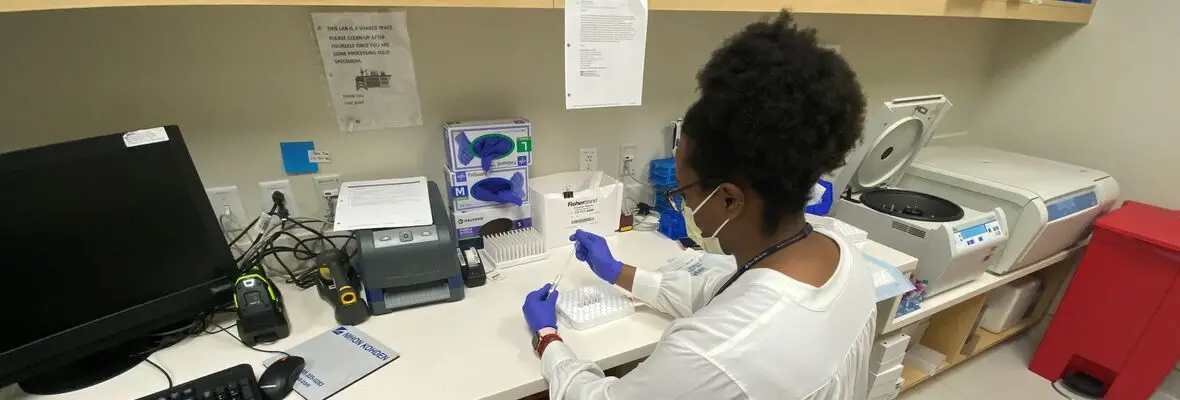Center for Gynecologic Cancer Immunotherapies
Clinical Director of Center for Gynecologic Cancer Immunotherapies

Dr. Janos L. Tanyi, Associate Professor in the Department of Obstetrics and Gynecology and Clinical Director of Immunotherapy in the Division of Gynecologic Oncology is an internationally known leader in clinical cancer immunotherapy who leads multiple immunotherapy trials targeting gynecologic malignancies. Dr. Tanyi earned his medical degree (summa cum laude) at the University of Debrecen in Hungary in 1993 and a doctorate at Semmelweis University, School of Clinical Sciences in Budapest, Hungary in 2008. He completed two residencies in obstetrics and gynecology; one five-year program at Semmelweis University (1993-98) and a second at Baylor College of Medicine which he finished in 2008. He was a postdoctoral fellow and research scholar at the University of Texas, Houston in between the two residencies (1999-2004). Dr. Tanyi completed a fellowship in gynecologic oncology at the University of Pennsylvania. He was a recipient of the NICHD Reproductive Scientist Development Program Award (2010-2015). He received the Health Care Hero Award for outstanding patient care at the University of Pennsylvania Health System 4 times in the past 7 years (2012, 2014, 2016, and 2017). In 2014 he received the Angela Carino Excellence in Ovarian Cancer Research and Care award by the Sandy Rollman Ovarian Cancer Foundation.
Today, he is the lead investigator of the Immunotherapy Research Program in the Division of Gynecologic Oncology. Dr. Tanyi was the principal investigator of three immunotherapy trials against epithelial ovarian cancers using dendritic cell vaccination and adoptive T-cell transfer. Dr. Tanyi successfully completed the dendritic cell vaccine trials and this work culminated in several high impact publications including Nature Communication, Cancer Cell and a first author paper in Science Translational Medicine (Personalized Cancer Vaccine Effectively Mobilizes Antitumor Immunity in Ovarian Cancer). Dr. Tanyi and his colleagues demonstrated that the vaccine induced T cell response to autologous tumor antigen was associated with significantly prolonged survival. Dr. Tanyi has also published two peer reviewed reviews on dendritic cell-based tumor vaccines and immunotherapy, and was recently invited to write the chapter on dendritic cell vaccine for ovarian cancer (Ovarian Cancer Immunotherapy, 2018).
Dr. Tanyi collaborates with Dr. Carl June to lead the clinical Car-T trials for ovarian cancer. He is currently the PI of the anti-mesothelin CAR-T cell trial for solid tumors. He published the first example of a compartmental cytokine release syndrome in solid malignancies (Possible Compartmental Cytokine Release Syndrome in a Patient with Recurrent Ovarian Cancer After Treatment with Mesothelin-targeted CAR-T Cells (J Immunother) and co-authored a publication in Molecular Therapy of a recent phase I study which demonstrated the CART-meso cells are well tolerated. Dr. Tanyi is the senior author of two peer-reviewed reviews on mesothelin as a target for CAR-T cell therapy. Studies are ongoing to evaluate a fully human anti-mesothelin CAR. In addition, he designs novel, evidence-based immunotherapeutic strategies to advance the treatment of ovarian cancer.
Scientific Director of Center for Gynecologic Cancer Immunotherapies

Dr. Daniel Powell Jr. is an Associate Professor in the Department of Pathology and Laboratory Medicine and the Department of Obstetrics and Gynecology. Dr. Powell is an international expert in cancer immunobiology and translational immunotherapy. He studies the role of the T cell response in the control of human cancer, focusing on ovarian cancer, and the application of adoptive lymphocyte immunotherapy, immunomodulation and cancer vaccination. Dr. Powell is the Scientific Director of Immunotherapy in the Division of Gynecologic Oncology, and is actively working to develop clinical trials of CAR T cell therapy for ovarian cancer. While at the National Cancer Institute, he developed combinatorial approaches for tumor vaccination, investigated the role of immunosuppressive regulatory T cells in cancer, and successfully applied adoptive T cell immunotherapy for the treatment of patients with metastatic melanoma. The Powell Lab is actively investigating basic T cell biology in order to develop translational immunology work to target T cell-based therapy for ovarian cancer. His focus to isolate high avidity, tumor-reactive T cells from heterogenous tumor infiltrating lymphocyte populations with T cell capture techniques in order to develop downstream studies of T cell receptor (TCR) isolation, cancer antigen identification and molecular characterization of tumor-reactive T cells. Another focus of his lab is the generation of tumor-reactive T cells through genetic engineering methods such as the isolation and cloning of T cell receptors (TCRs) that confer non-reactive T cells with specific and potent immune function following gene transfer via recombinant lentivirus or retrovirus or the use of chimeric antigen receptors (CARs) that confer T cells with the MHC-independent specificity of a tumor antigen-specific antibody and potent T cell activity delivered by TCR and costimulatory domains. Dr. Powell is well recognized for his contributions to the field of cancer immunotherapy; serves on various federal, academic and industry committees; and is a recipient of the Outstanding New Investigator by the American Society of Gene & Cell Therapy and mentor member of the Department of Defense Ovarian Cancer Academy.


